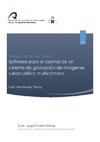Please use this identifier to cite or link to this item:
https://accedacris.ulpgc.es/jspui/handle/10553/66358
| DC Field | Value | Language |
|---|---|---|
| dc.contributor.advisor | Cabrera Gámez, Jorge | - |
| dc.contributor.author | Hernández Farray, Iván | - |
| dc.date.accessioned | 2020-01-23T02:13:28Z | - |
| dc.date.available | 2015-01-15T00:00:00Z | es |
| dc.date.available | 2020-01-23T02:13:28Z | - |
| dc.date.issued | 2014 | en_US |
| dc.identifier.other | contentdm-postulpgc | es |
| dc.identifier.uri | https://accedacris.ulpgc.es/handle/10553/66358 | - |
| dc.description.abstract | El proyecto “Software para el control de un sistema de grabación de imágenes subacuático multicámara” surge de la necesidad real del proyecto CICTY “Migradores y Flujo Activo en el Océano Atlántico” de intentar registrar visualmente los animales presentes a diferentes profundidades en la columna de agua. El sistema integra varias cámaras IR (Infrarrojos), un sensor de presión, un sistema de baterías IBPS (Intelligent Battery & Power System) de Li-Ion, sistema de control bajo Linux y focos led IR (Infrarrojos). La comunicación con la superficie se realiza a través del puerto auxiliar de un CTD Seabird instalado en una roseta oceanográfica y conectada a un cable coaxial de 8000 m. El sistema se ha diseñado para operar a una profundidad máxima de 6000 m a bordo del B.O. Hespérides. El objetivo principal, es desarrollar el sistema de control que se ejecutará en el procesador embarcado para sincronizar el disparo de las cámaras con el encendido/apagado de los focos, el almacenamiento de las imágenes, la monitorización de las variables de estado (presión interna y externa, baterías, temperatura) y la comunicación con la superficie. El modo de operación básico será el de un sistema de grabación time-lapse a una frecuencia variable, que podrá ser controlada desde superficie. Finalmente, se pretende disponer un sistema de grabación multicámara estable y energéticamente eficiente, capaz de operar durante 8 horas a una frecuencia de disparo máxima de 4 Hz. Además el sistema deberá transmitir a superficie mensajes de estado y actividad a una frecuencia programable. | en_US |
| dc.description.abstract | The project "Software for controlling multi-camera images recording underwater system" arises from the real need of CICTY project "Migrator and Active Flow in the Atlantic Ocean" attempting to record the present animals at different depths in the water column. The system integrates multiple IR cameras, a pressure sensor, a IBPS battery system (Intelligent Battery & Power System) Li-Ion, a CPU with Linux and focus led IR. Communication with the surface is performed through the auxiliary port of a Seabird CTD installed on an oceanographic rosette and connected to a coaxial cable of 8000m. The system is designed to operate at a maximum depth of 6000 m aboard the B.O. Hesperides. The main objective is to develop the control system that will run on the onboard processor to synchronize the trigger cameras with the focus on/off, storage of images, monitoring of the state variables (internal pressure and external batteries, temperature) and communication with the surface. The basic mode of operation is a system of time-lapse recording which can be controlled from surface. Finally, it is intended to provide a stable multi-camera recording system, able to operate for 8 hours at a trigger frequency of 4Hz.Moreover, the system must transmit status messages to the surface. | en_US |
| dc.format | es | |
| dc.language | spa | en_US |
| dc.rights | Acceso restringido para la comunidad universitaria de la ULPGC | es |
| dc.subject | 120317 Informática | en_US |
| dc.title | Software para el control de un sistema de grabación de imágenes subacuático multicámara | en_US |
| dc.type | info:eu-repo/semantics/bachelorThesis | en_US |
| dc.type | BachelorThesis | en_US |
| dc.contributor.departamento | Departamento de Informática y Sistemas | en_US |
| dc.contributor.facultad | Escuela de Ingeniería Informática | en_US |
| dc.identifier.absysnet | 705409 | es |
| dc.investigacion | Ingeniería y Arquitectura | en_US |
| dc.type2 | Trabajo final de grado | en_US |
| dc.description.notas | Disponible el vol. 1 | en_US |
| dc.description.numberofpages | 95 p. | es |
| dc.utils.revision | Sí | en_US |
| dc.identifier.matricula | TFT-30672 | es |
| dc.identifier.ulpgc | Sí | en_US |
| dc.contributor.buulpgc | BU-INF | en_US |
| dc.contributor.titulacion | Grado en Ingeniería Informática | es |
| item.grantfulltext | restricted | - |
| item.fulltext | Con texto completo | - |
| crisitem.advisor.dept | GIR SIANI: Inteligencia Artificial, Robótica y Oceanografía Computacional | - |
| crisitem.advisor.dept | IU de Sistemas Inteligentes y Aplicaciones Numéricas en Ingeniería | - |
| crisitem.advisor.dept | Departamento de Informática y Sistemas | - |
| Appears in Collections: | Trabajo final de grado Restringido ULPGC | |
Page view(s) 10
199
checked on Dec 14, 2024
Download(s)
35
checked on Dec 14, 2024
Google ScholarTM
Check
Share
Export metadata
Items in accedaCRIS are protected by copyright, with all rights reserved, unless otherwise indicated.
